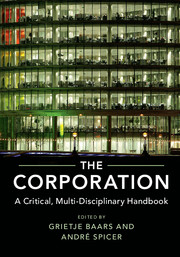Book contents
- Frontmatter
- Contents
- List of Contributors
- Acknowledgements
- Introduction: Why the Corporation?
- PART I DISCIPLINARY OVERVIEWS
- PART II INTERDISCIPLINARY THEMATIC CHAPTERS
- 1 The Evolution of the Corporate Form
- 2 The Multinational Corporate Group
- 3 The Financialization of the Corporation
- 4 Corporate Value Chains
- 5 Corporate Citizenship
- 6 The Corporation and Crime
- 7 The Corporation and Ideology
- 8 Corporation and Communities
- 9 Corporations and Resistance
- 10 Alternatives to the Corporation
- Index
- References
Introduction: Why the Corporation?
Published online by Cambridge University Press: 31 March 2017
- Frontmatter
- Contents
- List of Contributors
- Acknowledgements
- Introduction: Why the Corporation?
- PART I DISCIPLINARY OVERVIEWS
- PART II INTERDISCIPLINARY THEMATIC CHAPTERS
- 1 The Evolution of the Corporate Form
- 2 The Multinational Corporate Group
- 3 The Financialization of the Corporation
- 4 Corporate Value Chains
- 5 Corporate Citizenship
- 6 The Corporation and Crime
- 7 The Corporation and Ideology
- 8 Corporation and Communities
- 9 Corporations and Resistance
- 10 Alternatives to the Corporation
- Index
- References
Summary
The corporation has become a dominant form of economic life. While corporations have been with us since the early modern era, their influence and importance have grown exponentially. Today, corporations are among the largest economic entities in the world. Their annual turnover is greater than the gross domestic product of all but the largest nation-states. A handful of large corporations dominate most key global markets. Corporations – and their extended value chains – are an important source of employment. Governments rely on corporations – directly or indirectly – for tax revenues, expertise, and economic development. Citizens rely on corporations for everyday needs such as transport, healthcare, food, and utilities such as power and electricity. If we really want to understand the contemporary economy, a good place to start is the corporation.
Corporations are not just economically important. They play a vital role in politics. Corporations have become political actors in and of themselves. For instance, in the USA, corporations have been granted the rights of free speech and religious freedom normally given to flesh-and-blood citizens. Worldwide, corporations often have a huge influence on the creation of international agreements and standards. For instance, large corporations play an important part in drafting international trade and investment agreements. In some cases, corporations end up playing a quasi-state role – particularly when governments are unwilling or unable to provide basic citizenship rights. For example, they have become important sources of welfare services, such as healthcare, education, and housing in some settings. With the rise of neoliberalism, many states have outsourced the provision of public services to corporations. In the UK alone, about 50 per cent of public spending is outsourced – and a majority of that spending goes to corporations. The result is that activities which only a few years ago were seen as a preserve of the state – such as waging war or imprisoning citizens – have become corporatized activities.
In other settings, corporations have taken on a role of providing civic rights. For instance, social media companies like Twitter and Facebook claim to provide spaces of free speech. Some even claim that corporations now play a role in helping to guarantee political rights – such as the process of collective deliberation which takes place in company-sponsored ‘multi-stakeholder initiatives’.
- Type
- Chapter
- Information
- The CorporationA Critical, Multi-Disciplinary Handbook, pp. 1 - 18Publisher: Cambridge University PressPrint publication year: 2017
References
- 1
- Cited by



